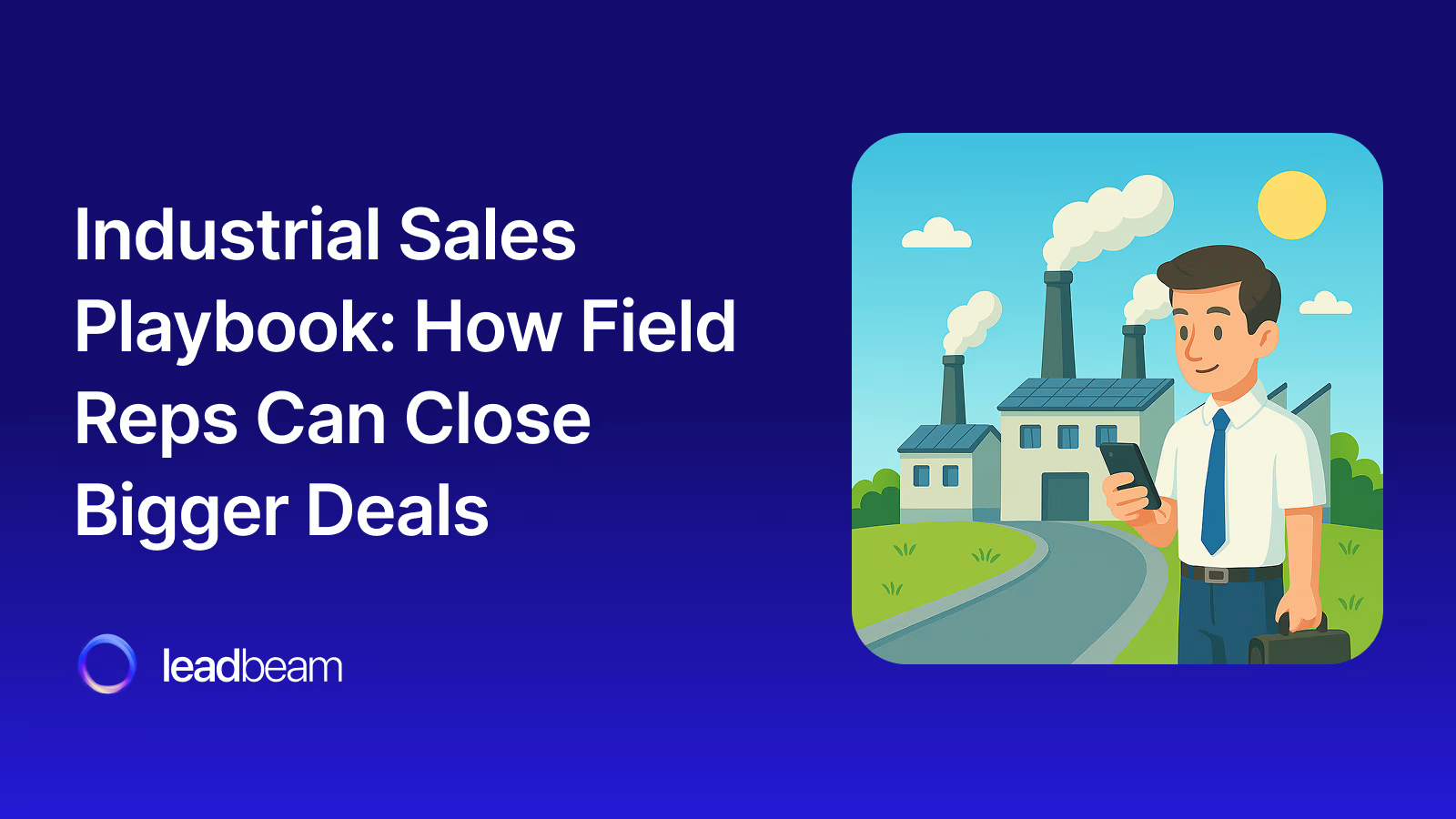
Is your field sales team spending more time staring at a windshield than shaking a client’s hand? Every hour spent wrestling with a map, logging notes, or deciding which lead to visit next is an hour not spent building relationships and closing deals. In the high-stakes world of industrial sales, this wasted time isn't just inefficient—it's a direct hit to your bottom line.
The game has changed. Closing a major deal for industrial equipment or manufacturing components isn't just about having the best product anymore. It's about being the smartest, fastest, and most valuable partner to your clients. But legacy tools and manual processes are holding even the best reps back, leaving them buried in admin work while their quota hangs in the balance.
This is the definitive playbook for modernizing your approach. We’ll break down the exact industrial sales strategies your field reps need to reclaim their time, focus on high-value activities, and start closing the bigger deals you hired them for. The secret isn't working harder; it's working smarter with a process powered by automation and data.
The landscape for manufacturing sales is more complex than ever. Unlike transactional B2C or SaaS sales, the industrial sales process is characterized by unique hurdles that can stretch deal cycles to months or even years.
These challenges create a perfect storm where reps are stretched thin, and managers lack clear visibility into what’s actually working in the field. Without a systematic approach, your team is flying blind.
A playbook isn’t just a document; it’s a living system for repeatable success. It standardizes best practices while using technology to eliminate friction. Here are the five core pillars.
Stop chasing smokestacks. The old method of "driving around the industrial park" is dead. Today’s top performers use a data-driven approach to identify accounts that fit their Ideal Customer Profile (ICP).
Your playbook should guide reps to focus on high-potential leads by analyzing factors like:
The Automation Edge: Instead of reps spending hours on manual research, an AI-powered platform can automatically surface high-potential leads within their territory. Imagine your CRM not just holding contacts, but actively suggesting which facility to visit next based on real-time buying signals and proximity. This shifts a rep’s focus from finding leads to engaging them.
In industrial equipment sales, you’re a consultant first and a salesperson second. Your goal is to diagnose problems, not just demo products. This requires a shift from a feature-based pitch to a value-based conversation.
Key Stages of a Consultative Conversation:
This approach positions your rep as a valuable expert and builds the trust necessary for a large capital expenditure.
This is the single biggest time-sink for field reps. Manually planning a multi-stop day is a logistical nightmare that leads to:
The Automation Edge: This is where technology provides an almost unbeatable advantage. A modern field sales app completely automates this process.
This automated approach transforms "windshield time" into valuable "face time," directly increasing the number of meaningful sales conversations a rep can have each day.
With long sales cycles, the follow-up is everything. Yet, it’s often where deals fall through the cracks. A rep might have a great meeting but forget a crucial follow-up task while driving to the next appointment.
Your playbook needs a systematic approach for nurturing leads between visits.
The Automation Edge: An intelligent system can automate the administrative side of follow-ups, ensuring nothing gets missed.
For sales managers, a lack of clean field data is a constant source of frustration. You can't coach what you can't see. When reps are manually logging activities (or not logging them at all), you have no way to identify what separates your top performers from the rest.
The Automation Edge: When a rep’s day is automated—from routing to follow-ups to logging notes—a powerful side effect occurs: you start collecting clean, consistent, and passive data.
This data is a goldmine. Managers can finally move from gut-feel coaching to data-driven leadership. You can answer critical questions like:
This feedback loop allows you to continuously refine your industrial sales process and scale the behaviors of your best reps across the entire team.
Let's make this real. BM Industrial, a leading distributor of industrial supplies, knew their experienced field sales team could be reaching more customers.
The Challenge:
The Solution:
B&M Industrial implemented Leadbeam's AI-powered field sales app to automate the team's entire day.
The Results:
By automating the data capture and meeting prep, B&M Industrial unlocked the high-value potential of its sales team, generating many more new opportunities in a short time. They empowered their reps to do what they do best: build relationships and solve customer problems.
You can read the full story of their success right here: B+M Industrial Case Study.
To thrive in today's competitive market, your industrial sales playbook must evolve.
The difference between a good industrial sales team and a great one is focus. A great team focuses its energy on the customer—understanding their needs, building trust, and solving their most complex challenges. They aren't bogged down by the logistics of getting from Point A to Point B or the administrative burden of proving they did their job.
If your team is still spending its days battling spreadsheets and maps, you’re leaving money on the table. It's time to equip them with a playbook and a platform built for the modern era of field sales.
Ready to see how you can automate your team's entire day, from lead generation to a closed deal, and unlock their true selling potential? Schedule a personalized demo of Leadbeam today.
Leadbeam Blog
Discover tips, strategies, and success stories to empower your field sales team and drive results.